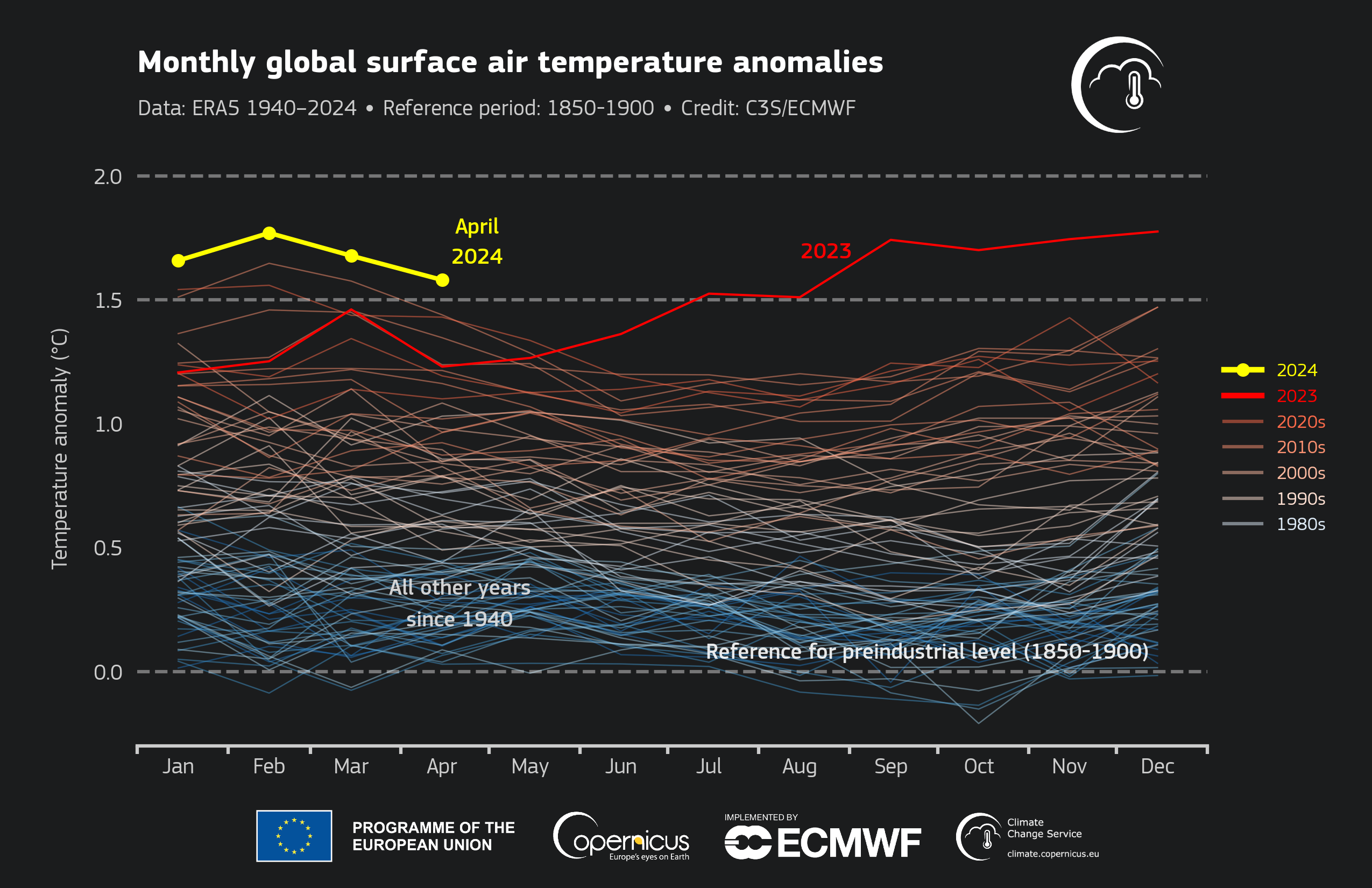April 2024 was hottest on record, marking 11 months of new highs
Copernicus confirms April was the hottest on record as brutal heatwaves bake dozens of countries in Asia
Your support helps us to tell the story
From reproductive rights to climate change to Big Tech, The Independent is on the ground when the story is developing. Whether it's investigating the financials of Elon Musk's pro-Trump PAC or producing our latest documentary, 'The A Word', which shines a light on the American women fighting for reproductive rights, we know how important it is to parse out the facts from the messaging.
At such a critical moment in US history, we need reporters on the ground. Your donation allows us to keep sending journalists to speak to both sides of the story.
The Independent is trusted by Americans across the entire political spectrum. And unlike many other quality news outlets, we choose not to lock Americans out of our reporting and analysis with paywalls. We believe quality journalism should be available to everyone, paid for by those who can afford it.
Your support makes all the difference.The streak of record global temperatures has continued for the 11th month in a row, with April 2024 the hottest ever recorded, scientists have said.
Last month was globally hotter than any previous April in records dating back to 1940, and 1.58 degrees Celsius warmer than the estimated average for pre-industrial levels.
April is the 11th month in a row that has been a record high for the time of the year, data released by the EU’s Copernicus Climate Change Service C3S shows.
The global average temperature for the past 12 months, from May 2023 to April 2024, have been 1.61C above the 1850-1900 period. This period is used as the benchmark for pre-industrial levels before human activities like burning coal and oil started to influence the global climate.
As temperatures soar, the world has been recording a large number of extreme weather events, including heatwaves, floods, droughts and wildfires.
This year again, brutal heatwaves have been shattering records across Asia as Bangladesh, South Korea and parts of India also record their hottest April. Many countries have closed schools or switched to online classes and ordered people to stay at home.
Extreme temperatures have killed at least 38 people in Thailand. Droughts have killed hundreds and thousands of fish in Vietnam and ruins of a 300-year-old town reappeared in the Philippines amid dwindling water levels in a reservoir.

In Europe, the continent warming fastest on Earth in the face of human-driven climate crisis, temperatures were 1.49C above the 1990-2020 average for April, making it the second hottest on record.
Average global sea surface temperatures outside the polar regions were 21.04C, the highest in records from 1979 for the month, and marginally below the record 21.07C seen in March.
The extra energy trapped into the ocean and the atmosphere by increasing concentrations of greenhouse gases will keep pushing the global temperature towards new records
It is the 13th month in a row that the sea surface temperature has been the warmest in the records for the respective month of the year.
The El Nino climate phenomenon in the Pacific, which also pushes up global temperatures, continued to weaken but marine air temperatures in general remained at an usually high level, scientists said.
Carlo Buontempo, director of the Copernicus Climate Change Service (C3S) said even as El Nino is now fading but human-caused climate crisis will “keep pushing” temperatures higher.
“El Nino peaked at the beginning of the year and the sea surface temperatures in the eastern tropical Pacific are now going back towards neutral conditions,” Mr Buontempo said.
“However, whilst temperature variations associated with natural cycles like El Nino come and go, the extra energy trapped into the ocean and the atmosphere by increasing concentrations of greenhouse gases will keep pushing the global temperature towards new records.”
David King, chair of the Climate Crisis Advisory Group and United Kingdom’s former chief scientific advisor said this continuous rise in temperatures is “incredibly concerning”.
“Adapting to extreme heat cannot be our only answer to this crisis,” he said, calling for urgent action to reduce carbon pollution.
“We cannot nibble around the edges of this problem. The costs of inaction will far outweigh the costs of action.”
